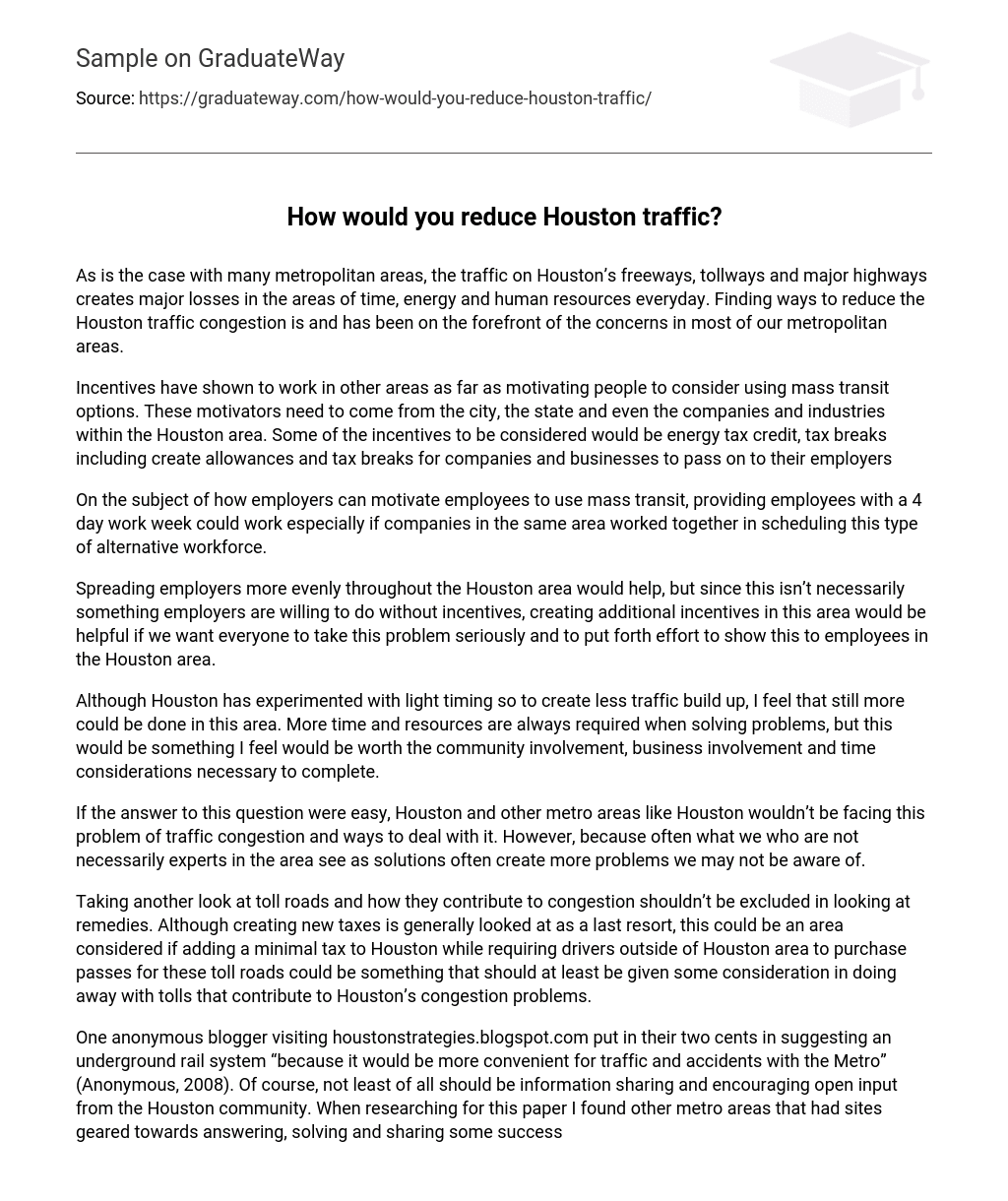As is the case with many metropolitan areas, the traffic on Houston’s freeways, tollways and major highways creates major losses in the areas of time, energy and human resources everyday. Finding ways to reduce the Houston traffic congestion is and has been on the forefront of the concerns in most of our metropolitan areas.
Incentives have shown to work in other areas as far as motivating people to consider using mass transit options. These motivators need to come from the city, the state and even the companies and industries within the Houston area. Some of the incentives to be considered would be energy tax credit, tax breaks including create allowances and tax breaks for companies and businesses to pass on to their employers
On the subject of how employers can motivate employees to use mass transit, providing employees with a 4 day work week could work especially if companies in the same area worked together in scheduling this type of alternative workforce.
Spreading employers more evenly throughout the Houston area would help, but since this isn’t necessarily something employers are willing to do without incentives, creating additional incentives in this area would be helpful if we want everyone to take this problem seriously and to put forth effort to show this to employees in the Houston area.
Although Houston has experimented with light timing so to create less traffic build up, I feel that still more could be done in this area. More time and resources are always required when solving problems, but this would be something I feel would be worth the community involvement, business involvement and time considerations necessary to complete.
If the answer to this question were easy, Houston and other metro areas like Houston wouldn’t be facing this problem of traffic congestion and ways to deal with it. However, because often what we who are not necessarily experts in the area see as solutions often create more problems we may not be aware of.
Taking another look at toll roads and how they contribute to congestion shouldn’t be excluded in looking at remedies. Although creating new taxes is generally looked at as a last resort, this could be an area considered if adding a minimal tax to Houston while requiring drivers outside of Houston area to purchase passes for these toll roads could be something that should at least be given some consideration in doing away with tolls that contribute to Houston’s congestion problems.
One anonymous blogger visiting houstonstrategies.blogspot.com put in their two cents in suggesting an underground rail system “because it would be more convenient for traffic and accidents with the Metro” (Anonymous, 2008). Of course, not least of all should be information sharing and encouraging open input from the Houston community. When researching for this paper I found other metro areas that had sites geared towards answering, solving and sharing some successes with traffic congestion and pollution in various other metro areas. One of which I found was California State Polytechnic University’s site Rideshare site. It doesn’t make sense to re-invent the wheel, so we need to look at how other metro areas are dealing with the same problems and to what they attribute any successes they have in this area.
Because one of the resources I used indicated that almost half of all of Houston’s traffic congestion is due to traffic incidents, I feel it is necessary to also discuss Safe Clear along with any alternatives individuals want to propose in this area. Although there has been debate on this particular program, it has shown to have some positive results for which we shouldn’t just toss out. If we need to fix things that are broken, this is the time to begin discussing those things along with other solutions in those areas.
References
- California State Polytechnic University Rideshare. (2008, October 24). Parking and Transportation Service. Retrieved October 26, 2008, from http://www.dsa.csupomona.edu/parking/default.asp
- Gattis, T. (2008, October 6). Houston Strategies. Retrieved October 17, 2008, fro http://houstonstrategies.blogspot.com/2005/05/how-houstons-traffic-congestion-stacks.html





